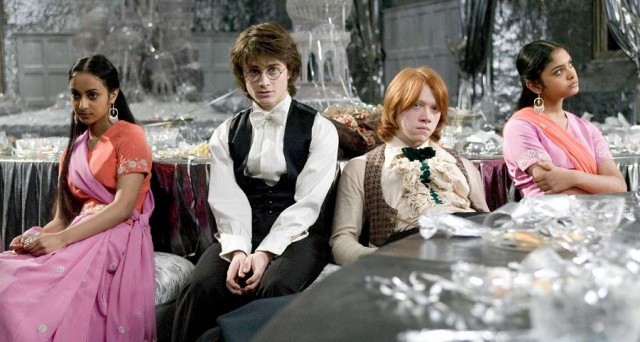How Wizards Do Money: Parvati Patil

The best thing about going to Hogwarts was that her mother could no longer worry at her to stop slouching.
“You are so beautiful,” Parvati could hear, the over-emphasis disproving its own words. “Why are you hiding your own beauty?”
The truth was Parvati didn’t care. She was never into shoes, or dresses, or cosmetics. She loved the Gryffindor uniform because she didn’t have to make choices about all of that anymore. She could get up, plait her hair, and be ready to go.
When Dean Thomas whispered that Parvati was one of the best-looking girls in her year, Parvati glared at him and slouched harder. She went off to Hogsmeade with the Beauxbatons student later that night because he hadn’t said that to her; he’d actually said something that was interesting. Parvati found him to be less interesting as the night went on, so she checked off “dating” from her list of curiosities and stopped worrying about brushing her hair.
Later her mother would ask “but aren’t you meeting any nice boys?” and Parvati would reply “I’m learning advanced defensive fighting skills so I can be in a wizard army, I don’t have time to meet boys.”
Because of this, Parvati was spared the crush of weddings that all seemed to take place immediately after the Second Wizarding War. Hermione and Ron, Neville and Hannah, Harry and Ginny — that boy could lead an army, maybe, but he was a right git — her classmates paired off and she and Padma were left standing alone.
Then Padma immediately got hired by the Ministry, and Parvati was left alone. Her mother and father both began asking “don’t you want to get a job?”
The answer was no, but Parvati knew that wasn’t a good answer.
Parvati spent the first year after what would have been graduation (but now was something different) feeling like she was disconnecting from everyone she knew. She went to parties, went to bars in Hogsmeade, and stood there. She watched as her classmates started transforming in front of her: changing from a mass of identically dressed students into who they really were. Ginny began playing Quidditch, Luna began her quest to find rarely-seen magical animals, Hermione continued to ask house-elves “don’t you want to get a job?” and Cho left.
Well. That was an idea.
“I’m going to travel,” Parvati told Padma. “I want to see the world.”
“That’s a bit stereotypical, don’t you think?” Padma said.
“You’re a bit stereotypical,” Parvati said. (They were twin sisters. It was okay.)
“Are you going to ask mum and dad for the money?”
“No,” Parvati said, before she realized what she was saying. “I’m going to earn it on my own.”
And that was how Parvati got her first job.
She felt happiest at places where she wasn’t on display, where she could show up in whatever she was wearing and not have to deal with people. She began filing, cleaning, sorting. She filled up her bank account and immediately emptied it all to fly to the Himalayas. She told her broom to fly itself home and bought a backpack and a sleeping bag. She cut off her hair. She started reading about philosophy and happiness and how to make your own life on your own terms.
She came back when the money ran out, spent three months helping an ancient wizarding family sort out its paperwork and records, and headed off again, this time on a Eurail pass because it was cheaper. She met a man on the train while she was slouching and disheveled and cramming a granola bar into her mouth. He did not say she was the prettiest person he had ever seen. He said things that were much more interesting.
Later, Padma and Parvati’s parents would marvel that both their daughters loved to travel so much. Padma and Fay were in Antartica, and Parvati and Richard were out hiking in New Zealand. Both twins would come back, save money, and be off again. Padma was by far more invested in her career than Parvati was, and Padma and Fay slowed their travel down considerably once they had their baby, but it seemed like once every year, and then later once every two or three years, one or the other of the Patel twins would send an owl with a travel itinerary to their parents and go exploring.
“My two beautiful daughters,” Parvati’s mother thought, and she was right.
Previously: Fay Dunbar
Support The Billfold
The Billfold continues to exist thanks to support from our readers. Help us continue to do our work by making a monthly pledge on Patreon or a one-time-only contribution through PayPal.
Comments